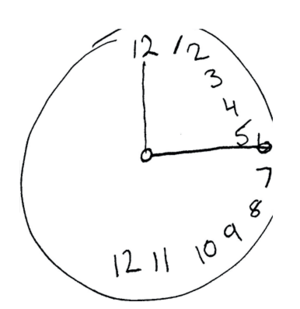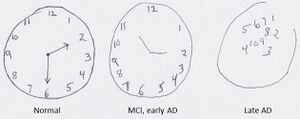Montreal Cognitive Assessment (MoCA)
Original Editor- Arnold Fredrick D'Souza
Top Contributors - Arnold Fredrick D'Souza, Lucinda hampton, Kim Jackson and Sultan Eylem Demirhan
Introduction[edit | edit source]
The MoCA is popular screening tool used to determine if cognitive impairment is present. It takes approximately ten minutes to complete. It evaluates visuospatial skills, attention, language, abstract reasoning, delayed recall, executive function, and orientation. The MoCA covers more domains than the MMSE and, as a consequence, has greater sensitivity and specificity.
Cognitive assessments are fast, easy-to-use, and accurate ways to help diagnose, evaluate progress, and manage many kinds of cognitive impairments. The MoCA is useful in determining a patient’s level of understanding and ability[1].
It was developed by Dr. Ziad S. Nasreddine and colleagues for quickly screening individuals for mild cognitive impairment.[2]
Intended Population[edit | edit source]
It can be used on the following populations:
- Older adults[3]
- Alzheimer’s dementia[4]
- Vascular cognitive impairment[5]
- Stroke[6]
- Parkinson’s disease[7]
- Progressive supranuclear palsy[8]
- Multiple system atrophy[8]
- Huntington’s disease[9]
- Schizophrenia[10]
- Brain tumours[11]
- Systemic lupus erythematosus[12]
- Substance use disorders[13]
- Idiopathic rapid eye movement sleep behavior disorder[14]
- Risk of falling[15]
- Epilepsy[16]
- HIV-associated neurocognitive disorders[17]
- Chronic obstructive pulmonary disease[18]
- Obstructive sleep apnoea[19]
Method of Use[edit | edit source]
It is a clinician-reported measure that takes about 10 minutes to administer. It measures cognition under the following domains: visuospatial skills, executive functions, attention, concentration, calculation, language, abstraction, memory, and orientation.
Visuospatial skills and executive function are assessed using the modified trail-making test, copy of the cube, clock drawing test, and naming.
- Attention is assessed using the digit span (forward and backward).
- Concentration and calculation are assessed using the letter A tapping test, and serial 7 subtractions.
- Language is assessed using sentence repetition and letter F fluency.
- Abstraction is assessed by asking about similarities between objects.
- Memory is assessed by a delayed recall of previous answers.
MoCA is scored out of 30. A cut-off score of 26 signifies mild cognitive impairment.[2]
- For a detailed description of MoCA, kindly refer the official brochure found here (Login required, Registration is free).
- Although MoCA is free-to-use, it has been mandated that clinicians and researchers undergo the MoCA Training and Certification Program offered on the official website.
This video demonstrates "clock drawing test" which is a usefull tool for cognitive impairement:
Evidence[edit | edit source]
Reliability[edit | edit source]
MoCA has high test-retest reliability (ICC = 0.92, p < 0.001). MoCA has good internal consistency (Cronbach's alpha = 0.82).[2]
Validity[edit | edit source]
For content validation, MoCA was compared with the Mini-Mental Status Examination (MMSE), where correlation was found to be high (r = 0.87, p < 0.001). Sensitivity was excellent (90%) and specificity was good (87%) for mild cognitive impairment.[2]
The convergent validity between MoCA and MMSE was high (r = 0.66, p < 0.001).[4]
Translations[edit | edit source]
It has been translated to over 50 languages which can be found on the official website linked below.
Digital applications[edit | edit source]
At present, the MoCA Duo App is available for use on the Apple App Store and Google Play Store. It is administered in-person. It has been validated and is comparable to the standard MoCA.[20] A self-administered version, the MoCA Solo App, will be released in 2022.
Links[edit | edit source]
For more information on MoCA, click here to visit the official website.
References[edit | edit source]
- ↑ Kelso IG, Tadi P. Cognitive Assessment. InStatPearls [Internet] 2020 Nov 20. StatPearls Publishing. Available:https://www.ncbi.nlm.nih.gov/books/NBK556049/ (accessed 31.3.2022)
- ↑ 2.0 2.1 2.2 2.3 Nasreddine ZS, Phillips NA, Bédirian V, Charbonneau S, Whitehead V, Collin I, Cummings JL, Chertkow H. The Montreal Cognitive Assessment, MoCA: a brief screening tool for mild cognitive impairment. J Am Geriatr Soc. 2005 Apr;53(4):695-9.
- ↑ Feeney J, Savva GM, O’Regan C, King-Kallimanis B, Cronin H, Kenny RA. Measurement Error, Reliability, and Minimum Detectable Change in the Mini-Mental State Examination, Montreal Cognitive Assessment, and Color Trails Test among Community Living Middle-Aged and Older Adults. J Alzheimers Dis. 2016 May 31;53(3):1107-14.
- ↑ 4.0 4.1 Lam B, Middleton LE, Masellis M, Stuss DT, Harry RD, Kiss A, Black SE. Criterion and convergent validity of the Montreal cognitive assessment with screening and standardized neuropsychological testing. J Am Geriatr Soc. 2013 Dec;61(12):2181-5.
- ↑ Koski L. Validity and applications of the Montreal cognitive assessment for the assessment of vascular cognitive impairment. Cerebrovasc Dis. 2013;36(1):6-18.
- ↑ Toglia J, Fitzgerald KA, O’Dell MW, Mastrogiovanni AR, Lin CD. The Mini-Mental State Examination and Montreal Cognitive Assessment in persons with mild subacute stroke: relationship to functional outcome. Arch Phys Med Rehabil. 2011 May;92(5):792-8.
- ↑ Gill DJ, Freshman A, Blender JA, Ravina B. The Montreal cognitive assessment as a screening tool for cognitive impairment in Parkinson’s disease. Mov Disord. 2008 May 15;23(7):1043-6.
- ↑ 8.0 8.1 Fiorenzato E, Weis L, Falup-Pecurariu C, Diaconu S, Siri C, Reali E, Pezzoli G, Bisiacchi P, Antonini A, Biundo R. Montreal Cognitive Assessment (MoCA) and Mini-Mental State Examination (MMSE) performance in progressive supranuclear palsy and multiple system atrophy. J Neural Transm (Vienna). 2016 Dec;123(12):1435-42.
- ↑ Bezdicek O, Majerova V, Novak M, Nikolai T, Ruzicka E, Roth J. Validity of the Montreal Cognitive Assessment in the detection of cognitive dysfunction in Huntington’s disease. Appl Neuropsychol Adult. 2013 Jan 1;20(1):33-40.
- ↑ Yang Z, Abdul Rashid NA, Quek YF, Lam M, See YM, Maniam Y, Dauwels J, Tan BL, Lee J. Montreal Cognitive Assessment as a screening instrument for cognitive impairments in schizophrenia. Schizophr Res. 2018 Sep;199:58-63.
- ↑ Olson RA, Chhanabhai T, McKenzie M. Feasibility study of the Montreal Cognitive Assessment (MoCA) in patients with brain metastases. Support Care Cancer. 2008 Nov;16(11):1273-8.
- ↑ Paez-Venegas N, Jordan-Estrada B, Chavarria-Avila E, Perez-Vazquez F, Gómez-Bañuelos E, Medina-Dávalos R, Ontiveros-González JÁ, Diaz-Rubio GI, Navarro-Hernandez RE, Vázquez-Del Mercado M. The Montreal Cognitive Assessment Test: A Useful Tool in Screening of Cognitive Impairment in Patients With Systemic Lupus Erythematosus. J Clin Rheumatol. 2019 Dec;25(8):325-8.
- ↑ Gagnon J-F, Vendette M, Postuma RB, Desjardins C, Massicotte-Marquez J, Panisset M, et al. Mild cognitive impairment in rapid eye movement sleep behavior disorder and Parkinson’s disease. Ann Neurol. 2009;66:39–47.
- ↑ Gagnon J-F, Postuma RB, Joncas S, Desjardins C, Latreille V. The Montreal Cognitive Assessment: a screening tool for mild cognitive impairment in REM sleep behavior disorder. Mov Disord. 2010;25:936–40.
- ↑ Liu-Ambrose TY, Ashe MC, Graf P, Beattie BL, Khan KM. Increased risk of falling in older community-dwelling women with mild cognitive impairment. Phys Ther. 2008;88:1482–91.
- ↑ Phabphal K, Kanjanasatien J. Montreal Cognitive Assessment in cryptogenic epilepsy patients with normal Mini-Mental State Examination scores. Epileptic Disord. 2011;13:375–81.
- ↑ Rosca EC, Albarqouni L, Simu M. Montreal Cognitive Assessment (MoCA) for HIV-Associated Neurocognitive Disorders. Neuropsychol Rev. 2019 Sep;29(3):313-27.
- ↑ Crişan AF, Oancea C, Timar B, Fira-Mladinescu O, Crişan A, Tudorache V. Cognitive impairment in chronic obstructive pulmonary disease. PLoS One. 2014;9:e102468.
- ↑ Chen R, Xiong KP, Huang JY, Lian YX, Jin F, Li ZH, et al. Neurocognitive impairment in Chinese patients with obstructive sleep apnoea hypopnoea syndrome. Respirology. 2011;16:842–8.
- ↑ Berg JL, Durant J, Léger GC, Cummings JL, Nasreddine Z, Miller JB. Comparing the Electronic and Standard Versions of the Montreal Cognitive Assessment in an Outpatient Memory Disorders Clinic: A Validation Study. J Alzheimers Dis. 2018;62(1):93-7.








